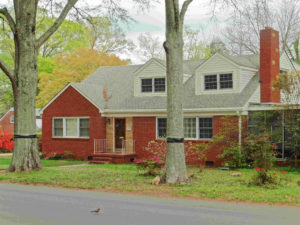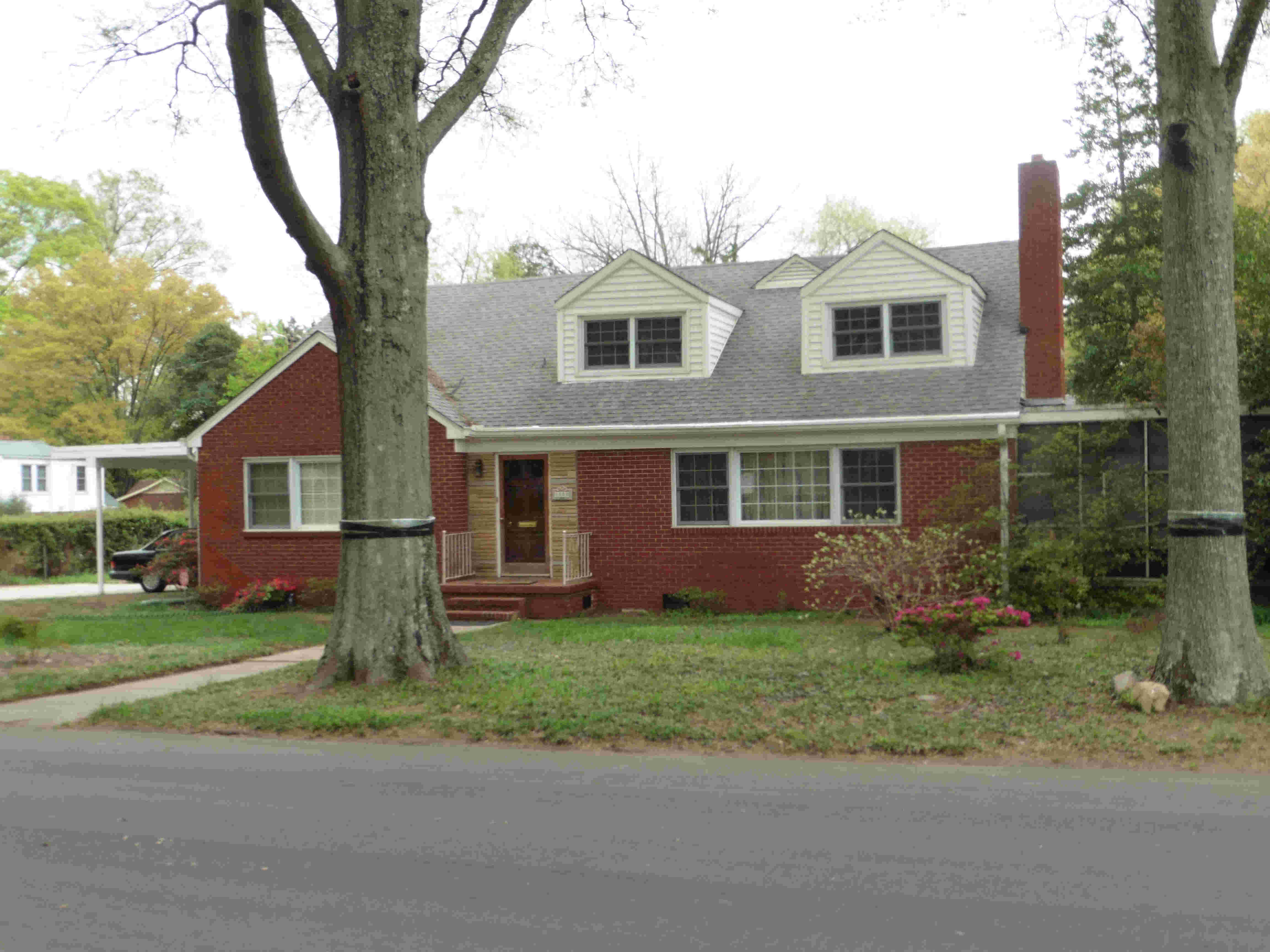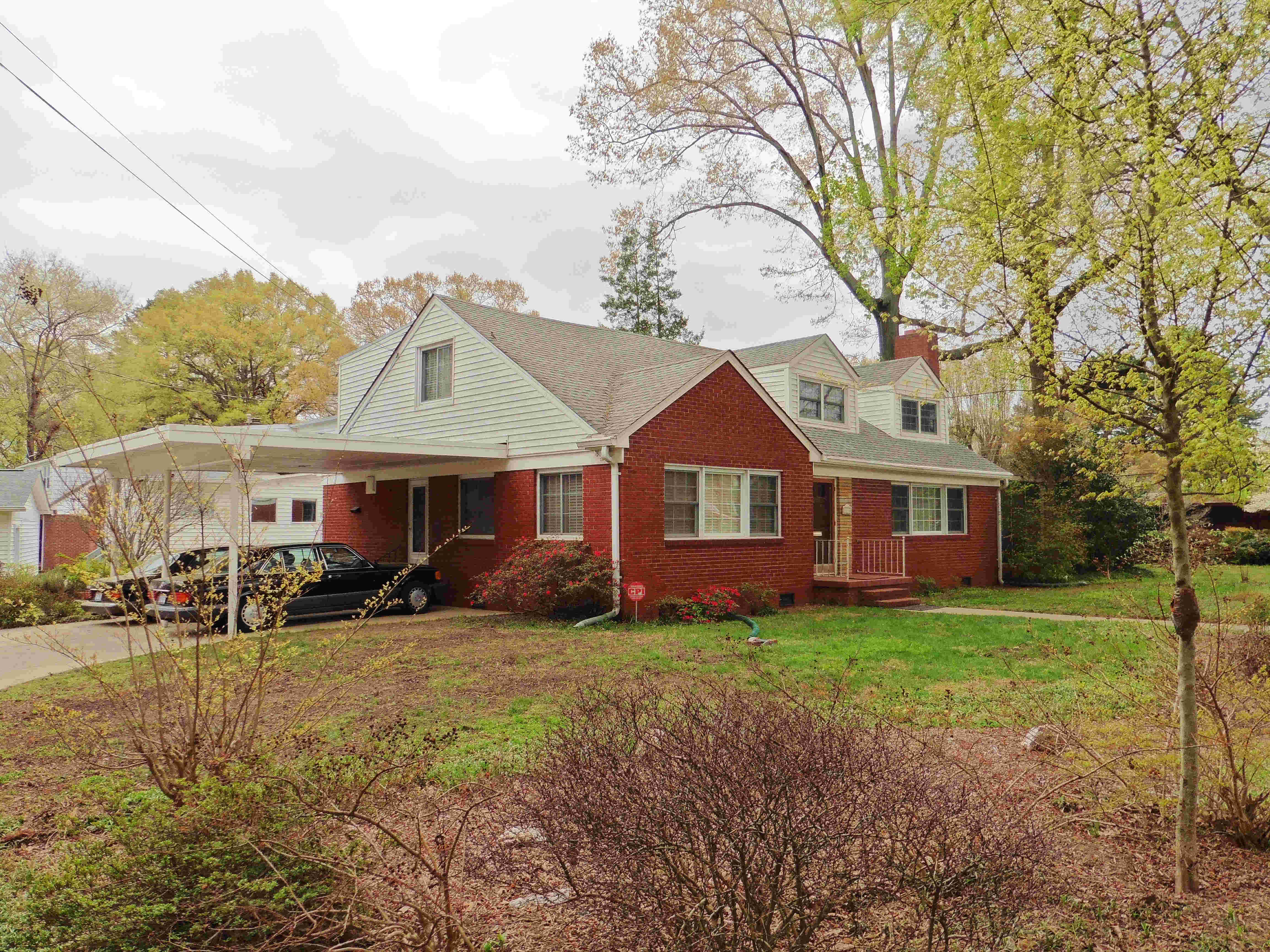1000 Clifton Avenue
 Built in 1952 for Cora Tate Booton, then a widow and a teacher at Isabella Wyche School. She and sister Aurelia Tate Henderson, who also lived here for many years, belonged to one of Charlotte’s most important African American families, that of turn-of-the century business and civic leader Thad Tate.
Built in 1952 for Cora Tate Booton, then a widow and a teacher at Isabella Wyche School. She and sister Aurelia Tate Henderson, who also lived here for many years, belonged to one of Charlotte’s most important African American families, that of turn-of-the century business and civic leader Thad Tate.
Cora and her husband Ray A. Booton, Sr., raised son Ray A. Booton, Jr (February 15, 1920 – August 30, 2009), who helped integrate the police force in the 1940s and Charlotte’s public golf course in the 1950s.
William H. Greene bought the house from the Tates in the early 1990s and lived here into the 2010s. An educator and fundraiser, his career included a stint as president of Livingstone College, the flagship educational institution of the A.M.E. Zion denomination. His wife Dr. Ruth Greene was a professor at Johnson C. Smith University with a national reputation in the field of psychology.
***
In the years around 1900, no African American did more for Charlotte than Thad Tate. As barber whose downtown shop served the most elite white clients, he had a sizable income and the ear of powerful men. He helped start Grace AME Zion Church, co-developed the adjacent Mecklenburg Investment Company office building, sold land to the city for the original West Charlotte High, and much more. His story is told at length by historian Janette Greenwood in her book Bittersweet Legacy: The Black and White ‘Better Classes’ in Charlotte, 1850 – 1910. Thadeus Tate and his wife Mary Butler Tate had ten children; people called the Tates “The Dozen Family.” All the children became educators, including young Cora (5.12.1892 – 1.29.1979).
“She received her early education in the public schools. Then to Scotia Seminary and Hampton Institute, completing graduate work at Columbia University,” noted her obituary. She taught in Charlotte public schools for thirty-two years, retiring in 1959. In 1952 as she turned 60, she built this house just off elite Oaklawn Avenue. It is one of a number of residences built in McCrorey Heights by community leaders as they neared retirement.
She married Ray Andre Booton on September 10, 1918. Their son Ray A. Booton, Jr. (2.15.1920 – 8.30.2009) became one of eight black officers who integrated the Charlotte Police Department in 1946. He initiated the 1951 lawsuit that desegregated Charlotte’s Bonnie Brae Golf Course (now the Dr. Charles L. Sifford Golf Course at Revolution Park). In 1999 he was inducted into the National Black Golf Hall of Fame and since 1992 a “Ray A. Booton Golf Classic” has been played annually in Charlotte to benefit his fraternity, Kappa Alpha Psi.
Like son Ray, Jr,. Cora Tate Booton enjoyed a busy social-civic life. She was active in Grace AME Zion Church uptown on Brevard Street, co-founded by her parents. She helped launch the Charlotte Chapter of the Links in 1955, part of the nationwide social organization that connected upscale African Americans and focused energy on civic philanthropy including the funding of education scholarships. She took pleasure in the meetings of the Bluebird Club — “the oldest Negro female social club in the city,” said her obituary — and played cards with the Chip and Dip Bridge Club.
In her later years Cora Tate Booton shared this house with her sister Aurelia Tate Henderson (3.4.1900 – 1997), who continued to live here after Cora’s death in 1979. Aurelia Tate graduated from Livingstone College and taught at Charlotte’s Myers Street School. She twice married medical men — dentist Dr. Strickby Smith in Chattanooga and pharmacist Dr. Harry Henderson of Atlantic City, New Jersey — and was twice widowed. She returned home to Charlotte in the late 1950s, joined her sister in the Links, Grace AME Zion church and other activities, and also ran a post office on LaSalle Street under contract with the U.S. postal system.
[Note that Booton is frequently misspelled Bouton]
See also 1722 Van Buren Avenue in McCrorey Heights, built about 1959 for Ray A. Booton, Jr., and Laura M. Booton.
***
Dr. William H. Greene bought the house at 1000 Clifton Avenue from the Tate descendants in the early 1990s and lived here for over two decades. He was the son of Malachi Greene, Sr., one of the city’s leading contractors, and the brother of Malachi Greene, Jr., a political leader in state and local government.
Coming out of high school in Charlotte in the mid 1960s, William Greene had been recruited to be one of the early African American students at North Carolina State University but grew disenchanted — “I got tired of overcoming” — and transferred to Johnson C. Smith University where he graduated in 1967. The Civil Rights movement’s focus on grassroots community empowerment was then at its height. William Greene found a teaching position in rural eastern North Carolina where he delighted in working with poor families, helping them help their youngsters to go beyond rudimentary schooling. Inspired, he went to Michigan State to earn a doctorate in education.
That opened doors for a wide-ranging career in university administration included serving as president from 1983 to 1987 of Livingstone College, the flagship educational institution of the A.M.E. Zion denomination.
“William H. Greene was a founding Director of the Navy Race Relations School, and served as Dean of Liberal Arts and Sciences at Gaston College, President of Livingstone College, and most recently, Director of Development and Assistant to the Vice Provost for Minority Affairs at The Ohio State University,” noted a University of Wisconsin publication when Greene visited for a speaking engagement in 2014. He also worked as an administrator at Amherst in Massachusetts and Fayetteville State in eastern North Carolina.
His wife Dr. Ruth L. Greene, Distinguished Professor of Psychology at JCSU, won a national reputation for her expertise on African American families and education. She earned her PhD at University of Massachusetts. Her work beyond JCSU included stints as Assistant Dean at Mt. Holyoke College, Chair of the Education and Psychology Department at Fayetteville State University and researcher for the National Institutes of Health and the U.S. Department of Defense.
William and Mattie Greene lived at 1704 Patton Avenue in McCrorey Heights beginning about 1979, then moved here to 1000 Clifton Avenue in the early 1990s.


Architecture
Cape Cod style house, 1.5 stories, in red brick with a main gable roof and a small front gable. Side carport added. Second owner William Greene enclosed the side porch.
Building permits
Clifton-1000-permit-a
Date issued: September 23, 1963
Owner: Mrs. A. T. Booton
Contractor: Interstate Electric Co.
Estimated cost:
Other permit info: electrical inspection for new water heater
Clifton-1000-permit
Date issued: December 22, 1960
Owner: Mrs. A. T. Henderson
Contractor: Garmon & Matthews
Estimated cost:
Other permit info: Gas installation
First appeared in city directory
1953 – Cora T. Booton (widow of Ray). Teacher, Isabella Wyche School
2000 city directory – William H. Greene & Ruth L.
Resources
“Charlotte Chapter History,” Charlotte Links, Incorporated website.
“Cora Tate Booton,” on the FindAGrave.com website.
Greenwood, Janette, Bittersweet Legacy: The Black and White ‘Better Classes’ in Charlotte, 1850 – 1910 (UNC Press, 1994), especially pp. 240 – 243.
“Malachi Greene” obituary posted by the Cremation Society of Charlotte.
“Resolution Appointing Ray Andre Booton a Special Peace Officer in Police Dept.,” Charlotte City Council Minutes, February 19, 1946.
“Thad Lincoln Tate Family,” on the CMStory.org website of the Charlotte Mecklenburg Library.
“Visiting Scholar Greene Speaks About African American Parental Engagement,” Dance newsletter of the University of Wisconsin, January 18, 2014.
William H. Greene, oral history interview with Tom Hanchett, February 21, 2018.
Bouton, Ray, funeral program in the collection of Memorial Presbyterian Church, Charlotte.
Bouton, Laura, funeral program in the collection of Memorial Presbyterian Church, Charlotte.
Henderson, Aurelia Tate, funeral program in the collection of McCrorey Heights resident Audwin L. Ross, 1804 Van Buren Avenue, Charlotte.